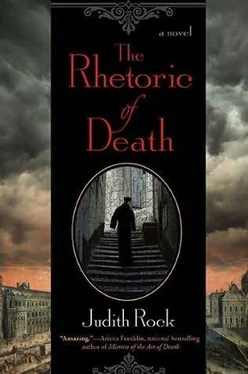Judith Rock - The Rhetoric of Death
Здесь есть возможность читать онлайн «Judith Rock - The Rhetoric of Death» весь текст электронной книги совершенно бесплатно (целиком полную версию без сокращений). В некоторых случаях можно слушать аудио, скачать через торрент в формате fb2 и присутствует краткое содержание. Жанр: Исторический детектив, на английском языке. Описание произведения, (предисловие) а так же отзывы посетителей доступны на портале библиотеки ЛибКат.
- Название:The Rhetoric of Death
- Автор:
- Жанр:
- Год:неизвестен
- ISBN:нет данных
- Рейтинг книги:3 / 5. Голосов: 1
-
Избранное:Добавить в избранное
- Отзывы:
-
Ваша оценка:
- 60
- 1
- 2
- 3
- 4
- 5
The Rhetoric of Death: краткое содержание, описание и аннотация
Предлагаем к чтению аннотацию, описание, краткое содержание или предисловие (зависит от того, что написал сам автор книги «The Rhetoric of Death»). Если вы не нашли необходимую информацию о книге — напишите в комментариях, мы постараемся отыскать её.
The Rhetoric of Death — читать онлайн бесплатно полную книгу (весь текст) целиком
Ниже представлен текст книги, разбитый по страницам. Система сохранения места последней прочитанной страницы, позволяет с удобством читать онлайн бесплатно книгу «The Rhetoric of Death», без необходимости каждый раз заново искать на чём Вы остановились. Поставьте закладку, и сможете в любой момент перейти на страницу, на которой закончили чтение.
Интервал:
Закладка:
Of course, all this had begun long ago, more than a hundred years ago in France’s Wars of Religion. True, much had changed since then, but France was still soaked in blood. Like most French children in the century since those wars, Charles knew the terrible stories by heart: stories full of the frenzied shouts of Protestant and Catholic mobs, the clash of arms, the reek of blood, the stench of burning, the dying shrieks of the slaughtered on both sides, the laughter of the looters who cared nothing for either side. Du Lucs had fought on both sides and their clashing loyalties had left wounds in the family, but Charles’s Catholic parents, like their parents and grandparents before them, did what they could for their still-beleaguered French Protestant kin.
The king had formally forbidden using the dreaded soldiers called dragoons to force conversions, but he turned a blind eye as local officials went on billeting dragoons on Huguenot families and letting them pillage, torture, and rape, until their victims either went bruised and bleeding to Mass, or died. Nimes, where Pernelle had lived, had been a mostly Huguenot town, known far and wide as “Little Geneva.” But when its citizens heard that the soldiers were coming, they had “converted” en masse, hoping to spare their children the cruelties of the “preachers in boots.” The “conversions” were only for survival, though, and The Religion continued in secret.
Charles had burned the letter and dropped the ash down the latrine. Then he’d gone to the college rector’s office and begged leave to go to his mother, who was taken ill, he’d said, with what her physician feared was plague. Permission to go, but only for five days-and without the normally prescribed companion, because why expose anyone else, if it was indeed plague? — was hardly out of the rector’s mouth before Charles was gone.
He’d ridden hard to Avignon, found the great bridge partly washed away by the spring floods, and taken the ferry across the Rhone. There he’d turned a little north to cross the Pont du Gard, then south again toward Nimes. At Blessed Sacrament Convent, his sister Claire, the convent’s Cellarer, had given him a covered basket. “I will pray for you,” she’d whispered as she kissed him. “For all of you.”
When dark fell and the couvre-feu bell rang, he’d made his way with a shaking heart through an old breach in the town wall, past the ghostly remains of the Roman temple, into Nimes’s tangle of tiny lanes. He’d eluded the guard at Pernelle’s gate, climbed her wellyard wall, and when she’d opened the door, stepped like a man dreaming into her cousinly embrace and kiss. When she pulled back, out of his arms, he’d stood wordlessly drinking in her cloud of black hair, her onyx eyes shining with intelligence, the strong clear curves of her cheekbones.
Until that night in Nimes, he hadn’t seen her for ten years, not since the night their parents had discovered their secret betrothal. He’d been eighteen and she sixteen, both green enough to think that love could overcome anything, even their warring religions. But her parents had quickly betrothed her to a young Huguenot watchmaker, David Potier, and Charles had taken his shattered heart into the army. Now he was a Jesuit, and she was a mother and a widow, David having died last Christmas. Their paths had long diverged, their love had found other and better homes.
I didn’t do it because I still love her, You know that, Charles said silently, opening his eyes and looking up into the twisted branches above his head. He said it as though Love Himself were there on the rock beside him. Charles made little difference between this kind of inner talk and prayer, letting one become the other, the way speaking could fountain into singing and settle again to ordinary talk. I mean, he amended conscientiously, I do love her, but not in the old way. Love said nothing, though it seemed to Charles that the quiet took on a certain ambiguous quality. I am not condoning heresy, he added firmly. I know the danger of mistaking single truths, or angers, or plain craziness for You. But I will never believe that You want cruelty. The river music seemed to grow louder in the stillness. And if I’m not supposed to judge what’s being done to the Huguenots, Charles said, reaching his customary closing argument in the one-sided debate, why did You give me a conscience? Love continued to say nothing, as was also customary. But it was a vast, still nothing, and it calmed Charles’s arguing into sleep.
He woke, instantly alert, the way he’d learned to wake in the army, sat up, and started pulling on his stockings and boots, listening intently again to the countryside. Nothing seemed to have changed, except that a pair of ducks, a bright feathered male and his softly brown mate, floated past, riding the river. Sitting with a boot in his hand, Charles watched them disappear around a bend. An old Provencal poem sang through his mind.
Joyous in love, I make my aim forever deeper in Joy to be.
The perfect Joy’s the goal for me: So the most perfect lady I claim…
He pulled on the boot, wondering if Pernelle remembered the poem and the music he’d made and set it to, for singing to her. He hoped Geneva would prove a true home for her, prayed that she and her child, Lucie, and her young sister-in-law, Julie, were safely there, at their journey’s end. He still shuddered when he thought of their miraculous flight through silent, sleeping Nimes. In the army, he’d earned a reputation as a scout and spy, and that night he’d been grateful for it. Once they were away from Nimes, the women had passed unquestioned in the nuns’ habits his sister had hidden in the basket she’d given him, and they’d explained Lucie as a child in their charge, now going to live with an aunt in Orange. In Carpentras, again wearing their own clothes, Pernelle and Julie had passed as a Catholic widow and her maid at the convent guesthouse near the Jesuit college where Charles lodged them. And there the Virgin made them another miracle. A wealthy elderly widow at the guesthouse, on her way home to her lands near the Swiss border after a leisurely pilgrimage to shrines of Our Lady, fell in love with little Lucie and invited Pernelle to travel in her entourage. Giddy with relief and trying to ignore the pain in his heart, Charles had watched the lumbering coach and its six armed outriders dwindle and disappear into the distance. He would never see Pernelle again. Which, of course, was as it should be.
Charles shook his head, as if to shake the memories out of it, and got to his feet. The trouble with knight errantry-for a Jesuit, at least-was that, just like in the old stories, it involved a lady. And, just like in the old stories, it had set him on a journey, thanks to the long and branching du Luc family grapevine. Another cousin, the newly appointed Bishop of Marseilles, had learned what Charles had done in Nimes. The bishop had been scandalized, but he had always had a fondness for Pernelle, and family was family. Instead of turning Charles in, he’d leaned hard on several highly placed Jesuits and gotten his rash cousin sent to Paris, as far away as possible from Marseilles and his own unblemished reputation.
Back on the dust-clouded road, Charles forced his horse into a trot. His thoughts circled back to his mother’s letter. I pray that you will be safe in every way, she’d written. Safe from Pernelle’s wiles, she’d meant, safe in his vocation. But his vocation was already in danger when the letter arrived. He rode wide around a high-wheeled oxcart, calling a greeting in Provencal to the sunburned paysan driving it. The man, nearly as broad-backed as his ox, glowered in silence and Charles heard him spit when he was past. A Huguenot, then, though most followers of The Religion were townsmen, not countryfolk. Charles felt the man’s eyes still on his back. The paysan represented what was troubling Charles’s vocation. The Society of Jesus wielded great spiritual and temporal power, often for good, since it usually took power to fight power’s wrongs. But the Society had done nothing to stop the dragonnades and its voice had been strong among those urging the king to revoke the Edict of Nantes. Jesuits had helped bring this new wave of suffering on the Huguenots and Charles was finding that very hard to live with.
Читать дальшеИнтервал:
Закладка:
Похожие книги на «The Rhetoric of Death»
Представляем Вашему вниманию похожие книги на «The Rhetoric of Death» списком для выбора. Мы отобрали схожую по названию и смыслу литературу в надежде предоставить читателям больше вариантов отыскать новые, интересные, ещё непрочитанные произведения.
Обсуждение, отзывы о книге «The Rhetoric of Death» и просто собственные мнения читателей. Оставьте ваши комментарии, напишите, что Вы думаете о произведении, его смысле или главных героях. Укажите что конкретно понравилось, а что нет, и почему Вы так считаете.












